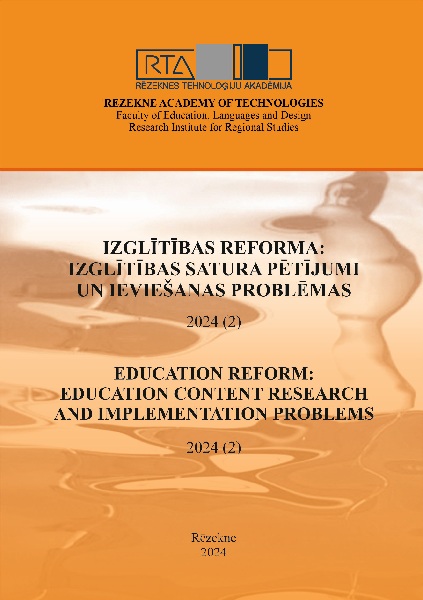ACQUISITION OF HYGIENE NORMS FOR STUDENTS WITH MENTAL DEVELOPMENTAL DISABILITIES IN THE EDUCATIONAL PROGRAM “CATERING SERVICES”
DOI:
https://doi.org/10.17770/er2024.2.8277Keywords:
development of hygiene skills, mental disordersAbstract
People with mental disorders can learn basic professional skills and be employed in jobs that do not require academic knowledge, provided they receive education and support tailored to their abilities. Young individuals with mental disorders often lack knowledge and skills related to everyday life, as the skills typically acquired independently need to be specifically taught to them. One of the most critical skills is maintaining personal hygiene, as deficiencies in this area affect various aspects of life.
This research aimed to study the peculiarities of hygiene norm compliance skills among students with mental disorders and analyse the interaction between teachers and students in learning these hygiene norms.
In the course of the research, an analysis of relevant scientific literature and normative documents was carried out, as well as a group of students in the "X" school, which implements special education programs, was observed and a semi-structured interview was conducted with a vocational education teacher. As a result of the research, it was concluded that there is a close connection between all the skills to be learned in observing hygiene norms, that is, if one of the skills is not learned at a sufficient level, it causes problems in other aspects as well. It was concluded that the main reason for the lack of hygiene norm compliance skills is found in the family, as well as when the student is in an environment that is not suitable for him/her. The learning process of students with mental disorders requires an individual approach and multiple repetition of tasks. A positive atmosphere and the active activity of students during lessons have a beneficial effect on the development of hygiene skills. Integrating transversal skills into the learning process provides an opportunity to reduce the developmental characteristics of students with mental disorders, which is another reason for poor hygiene compliance skills.
References
Aberg, L. (2021). Kehitysvammaisuus. Retrieved from: https://www.terveyskirjasto.fi/dlk 00556
Abou Zeid Hassan, O. N., Abdel Hady El Karmalawy, E. M., & Mohammed, A. A. R. (2019). Effect of Personal Hygiene Program on Knowledges and Practices of Mentally Retarded Students at El-Fikrya schools in Minia Governorate, Egypt. Minia Scientific Nursing Journal, 5(1), 41-49. DOI: : https://dx.doi.org/10.21608/msnj.2019.187787
Brouwers, E. P. (2020). Social stigma is an underestimated contributing factor to unemployment in people with mental illness or mental health issues: position paper and future directions. BMC psychology, 8, 1-7. DOI: https://doi.org/10.1186/s40359-020-00399-0
Elmurzaeva, N.K., Qorayev, S.B. (2021). Pedagogical Requirements for the Organization of the Educational Process in Specialized State Educational Institutions. Psychology and Education Journal, 58(1), 1078-1084. Retrieved from: e038626151d337fd9a28427 ea989dc8a3dcb.pdf (semanticscholar.org)
Fischer E. (b.g.) Karrierechancen für Menschen mit geistiger Behinderung. Retrieved from: https://bildungsklick.de/aus-und-weiterbildung/detail/berufsperspektiven-fuer-menschenmit-geistiger-behinderung
Freimanis, L. (2007). Ieskats speciālās skolas darbā. Rīga: RaKa
Izglītības kvalitātes valsts dienests (2020). Mācību snieguma vērtēšanas veidi, formas un metodes. Pieejams: Kursi «Izglītības iestādes tiesiskās darbības pamati» (ikvd.gov.lv)
Juhnoviča, I. (b.g.). Skolēnu dažādās vajadzības kā norma izglītības sistēmā. Pieejams: RTA un VISC kursi_I.Juhnovičas prezentācija.pdf
Kalēja, J., Muižniece, M. (2021). Kartografēšanas ziņojums par jauniešu ar GAT kapacitātes veicināšanu sevis pasargāšanai no seksuālas vardarbības, seksuālās un reproduktīvās veselības un tiesību pienācīgu īstenošanu. Retrieved from: https://papardeszieds.lv/wp-content/uploads2022/06/kartografesanas-zinojumsJAGRTSRVT-2021.pdf
Kalvāns, Ē. (2017). Mūsdienu personības teorijas. Rēzekne, RTA
Laiho, M. (2018). Hyvinvointitaidoista tukea oppimiseen ja koulunkäyntiin – koulusta kantavin siivin elämään. Retrieved from: https://www.valteri.fi/artikkelit/hyvinvointitaidoista-tukea-oppimiseen-ja-koulunkayntiin-koulusta-kantavin-siivin-elamaan/
Liepiņa, S. (2008). Speciālā psiholoģija. Rīga, RaKa
Liljeholm, U., & Bejerholm, U. (2020). Work identity development in young adults with mental health problems. Scandinavian Journal of Occupational Therapy, 27(6), 431– 440. DOI: https://doi.org/10.1080/11038128.2019.1609084
Nazarova, N.M. (2000). VO Special'naja pedagogika. Retrieved from: https://studfile.net/ preview/5769617/page:14/
Oliņa, Z., (2019). Caurvijas – efektīvi rīki mācībās un dzīvē. Retrieved from: https://www.skola2030.lv/lv/jaunumi/blogs/caurvijas-efektivi-riki-macibas-un-dzive
Patel, D. R., Cabral, M. D., Ho, A., & Merrick, J. (2020). A clinical primer on intellectual disability. Translational pediatrics, 9(Suppl 1), S23. DOI: 10.21037/tp.2020.02.02.
Pedagogs.lv (b.g.). Pedagoģijas terminu skaidrojošā vārdnīca jeb īsi un saprotami par sarežģītajiem terminiem pedagoģijas mācībā. Retrieved from: https://pedagogs.lv/ 2018/02/11/pedagogijas-terminu-skaidrojosa-vardnica-jeb-isi-un-saprotami-par-sarezgitajiem-terminiem-pedagogijas-maciba/
Prudņikova, I. (2021). Skolēnu ar vidēji smagiem un smagiem garīgās attīstības traucējumiem praktiskās darbības pieredzes veidošanās speciālajā internātpamatskolā. Retrieved from: https://books.rta.lv/index.php/RTA/catalog/book/18
Rozenfelde, M. (2018). Skolēnu ar speciālām vajadzībām iekļaušanas vispārējās izglītības iestādēs atbalsta sistēma. Retrieved from: https://books.rta.lv/index.php/RTA/ catalog/book/6
Saeima, (2023). Vispārējās izglītības likums. Pieejams: https://likumi.lv/ta/id/20243-visparejas-izglitibas-likums
Soika, I. & Šidlovska, D. (2023). Jauniešu ar garīgās attīstības traucējumiem dzīves prasmes. TF studentu un maģistrantu zinātniskā konference. Retrieved from: https://www.tf.lbtu.lv/sites/tf/files/2023-05/TF%20magistrantu%20konference% 202023.pdf
Stubbing, J., Rihari, T., Bardsley, A., & Gluckman, P. (2023). Exploring factors influencing youth mental health: What we know and don’t know about the determinants of young people’s mental health. Retrieved from: https://researchspace.auckland.ac.nz/ handle/2292/66784
Tereško, A., Kondrova, A., Rozenfelde, M., & Želve, I. (2013). Metodiskais materiāls pedagogiem izglītojamo ar garīgās attīstības traucējumiem sociālo prasmju, uzvedības un mācību sasniegumu izvērtēšanai. Retrieved from:https://registri.visc.gov.lv/specizglitiba/dokumenti/metmat/esfpr/VISC%204.3%20-%20metod%20mater%20pedagogiem%20-%20garigas%20attiestibas%20trau.pdf
VISC, (2002). Profesiju standarts: Virtuves darbinieks. Retrieved from:https://registri.visc.gov.lv/profizglitiba/dokumenti/standarti/ps0033.pdf






